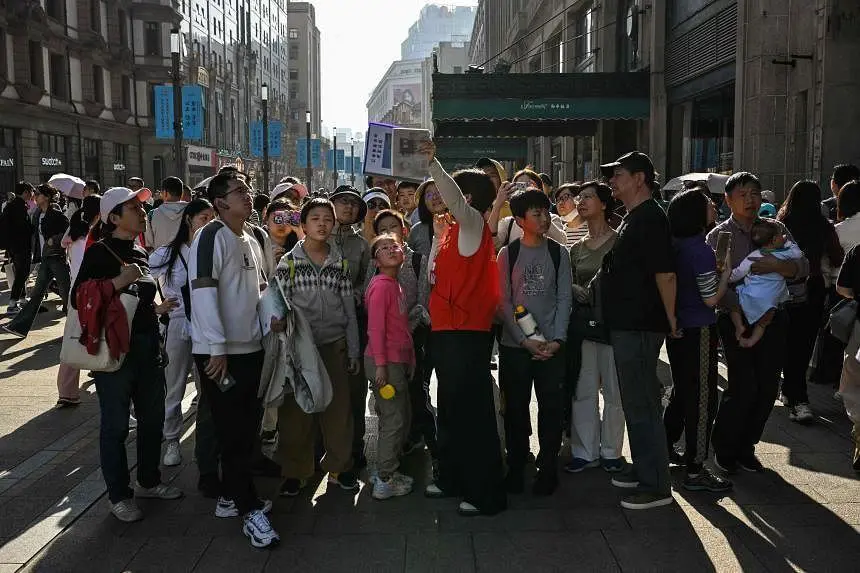Although they welcome the potential additional income, hotels in China that presently primarily serve locals are concerned that a recent regulatory change prohibiting them from turning away foreigners may mean more laborious procedures.
Hotel owners are no longer able to turn away foreign guests for lack of “foreign accommodation qualification,” the Chinese government announced on May 24 in a notice posted on its website.
Although exact numbers about the number of hotels that will be impacted by the new law are unavailable, it is anticipated that most of the nation’s hotels—which currently serve mainly the rapidly expanding domestic tourism market—would be impacted.
The police, the trade ministry, and the immigration authorities collaborated to make the most recent modification in response to complaints from foreign visitors—including those from Pakistan, Nigeria, and Britain—who said they were turned away from hotels when they tried to check-in.
The notification stated that hotel workers had informed them that they “could not enter the information into the system” or that they were unable to provide the police with the customers’ personal information.
To maintain track of international visitors, hotels in China are compelled to register foreign guests with the authorities within 24 hours of check-in. As a result, many operators simply refuse to accept foreign guests because of the trouble.
The notification also stated that the police, or the Ministry of Public Security, would expedite the registration procedure.
Employees at Chinese hotels that post on their walls that they only welcome international guests claimed they haven’t received any formal notice of the change.
They told The Straits Times that while they anticipate the changes will result in more business, they are concerned about the new registration procedures the police will demand now that everyone must comply.
“It was quite problematic, therefore we didn’t seek permission to host foreigners previously. The authorities will scrutinize us more closely and we will have to adhere to even more requirements if we seek the permit, a hotel employee in Xi’an, the capital of the northwest Shaanxi province, who only went by the name Hong, said.
He cited the fact that “only a couple of hotels accept foreigners” in the crowded Muslim Quarter of Xi’an, a popular tourist destination.
“Perhaps the authorities can request less information about foreign visitors checking in, or do away with the registration of foreign guests with the police entirely,” he continued. Clear scans of the passport, visa number, and the most recent entrance stamp into China are among the details needed.
The new regulations for hotels, according to Bai, the manager of a hotel in a county in the southwest Chinese province of Guizhou, will require more documentation that cannot be avoided by “simply refusing to accept foreigners,” as is currently the standard.
He recounted how local authorities removed limitations to enable visitors to stay at any hotel or bed & breakfast in Rongjiang county after village football in Guizhou became a global sensation in 2023.
Back then, all innkeepers had to do was snap pictures of the international visitors’ passports and the most recent entrance stamp in China, then forward those images to the local authorities via the messaging app Weixin.
Therefore, Bai stated, “Everything depends on how strictly the authorities enforce their checks.” “I hope local officials can be given the freedom to decide how to implement the changes by the central authorities.”
For the time being, both Hong and Bai stated they do not intend to begin accepting foreigners until they receive official notice. They declined to reveal their full names for fear of appearing to violate the new laws.
Thus far, the China Hotel Association has sent out a letter urging all hotels to advise their employees not to turn away international visitors and to offer them superior amenities, like English signage.
Allowing all hotels to accept international guests might help slow the drop in foreign visitors and increase tourism earnings, according to Dr Liu Simin, a tourism expert at the Beijing-based think tank China Society for Future Studies, who spoke with ST.
“This regulation essentially reduces the expense of travel to China, since foreign visitors can now book cheaper hotels that were previously exclusively accessible to residents,” he stated.
However, he anticipates that the gain would be temporary due to the unfavourable state of the world economy.
Journey.com The move, according to Singapore general manager Edmund Ong, will entice more travellers to China.
According to him, the modification “will further increase the accommodation options available to our users wherever they may be from.” “We firmly think that this will positively impact foreign travel to China.”
Travellers from wealthy nations have witnessed inflation causing their wallets to shrink. Although the value of the Chinese yuan has declined, making travel to China more affordable for international tourists, the currencies of Thailand and Japan, which are nearby, have declined even further, making them more alluring to travellers on a tight budget.
when the tight Covid-19 restrictions, costly flights when the pandemic recovered, and strained relations with the US and EU, China’s inbound tourism has yet to recover.
According to immigration data, the number of foreign admissions and exits registered by border officials in 2023 was 35.5 million, a decrease of 63.7% from the 97.7 million recorded in 2019 before the pandemic.
The most recent action China has taken to entice visitors to the second-biggest economy in the world is to let them stay at any hotel of their choice. This comes after Chinese President Xi Jinping urged foreign guests to witness the “Real China” for themselves on several occasions.
Beijing employs the term “Real China” to refute any unfavourable portrayal of the country in international media reports, including claims of violations of human rights.
On May 7, Xi declared that the visa-free status would be extended to 11 European nations, including Belgium, France, Germany, and Malaysia, until the end of 2025, during an official visit to France.
As a result, visitors from these nations will be able to enter China for a maximum of 15 days without a visa.
In addition to easing visa requirements, China has directed payment companies to facilitate foreigners’ ability to make purchases within the nation.
One of the two most popular e-wallets in China, Alipay, stated in March that foreigners visiting the country can now spend up to US$5,000 (S$6,750) in a single transaction (up from US$1,000) if they register their identities with the operator.
Spending is now permitted for those who did not register with the operator, up from US$500 to US$2,000 annually.
Adam Duan, 38, a French national residing in Shanghai, works as a management consultant and expressed his excitement about the changes.
“In the more remote areas of China, reservations for hotels that accommodate foreign guests can be exceedingly challenging,” stated Duan.
He continued, “I’ve been depending on my Chinese friends to make hotel reservations at these locations, then I sneak into the rooms afterwards.”
“I’m relieved those days are almost over.” – The Straits Times/ANN





